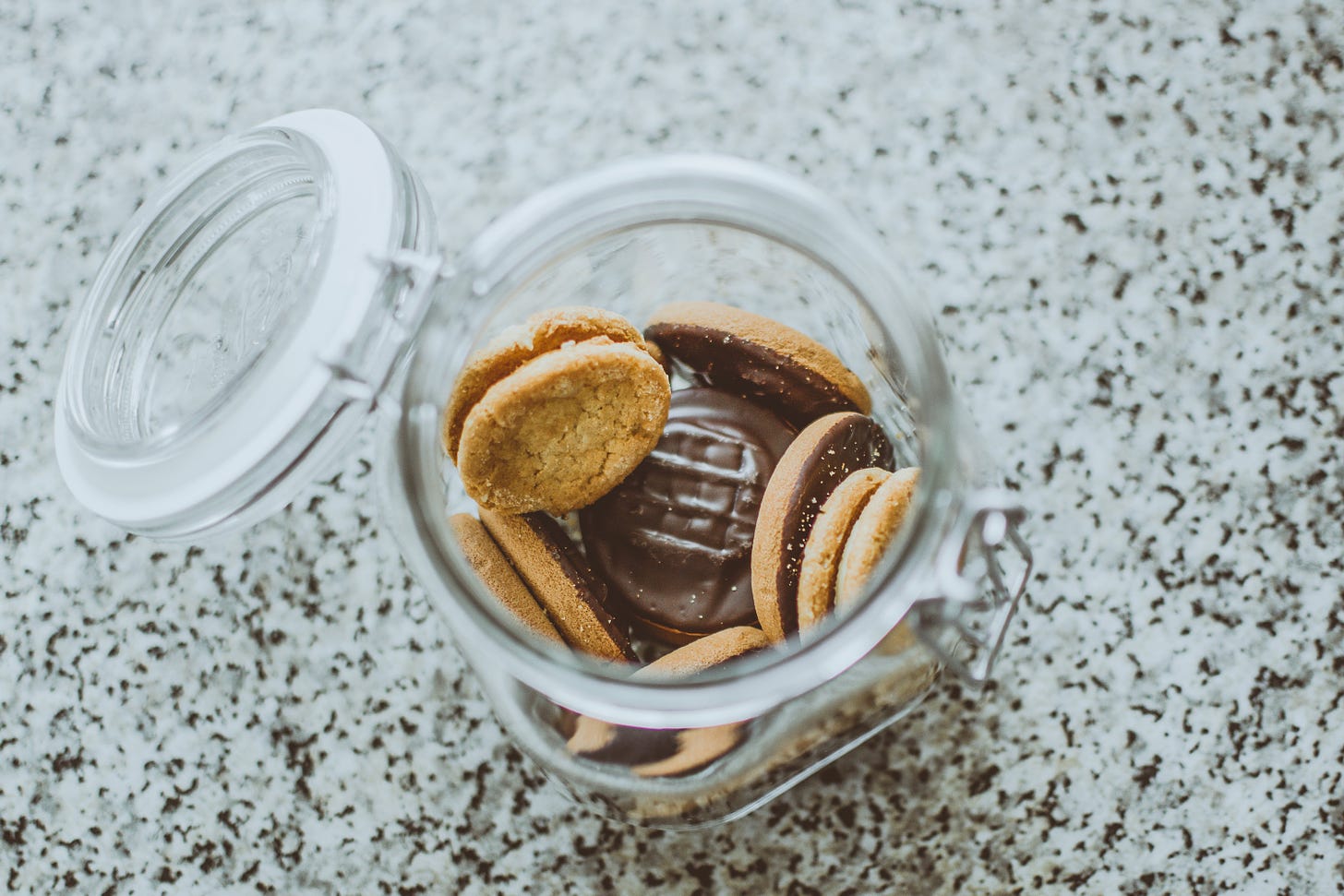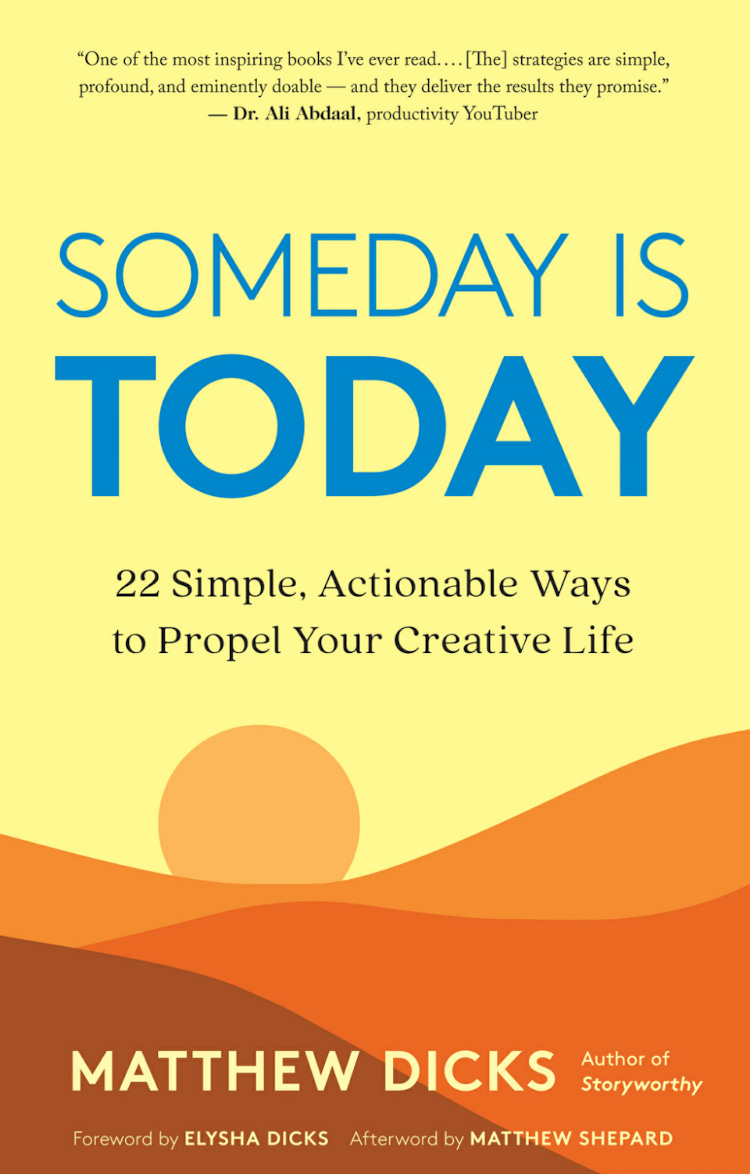On tough days, it is easy to fall into a negativity spiral.
When we’re dealing with bad news, a personal failure, someone treating us badly, or something more pervasive — such as a general feeling of hopelessness — positive thoughts are often nowhere to be found.
Self-doubt is a negativity spiral all its own. Even if we know that deep down, we are loved and have worth, even if we know that we are capable and resilient, we still choose to focus on our shortcomings.
I would know. It took a while to learn how to counteract my daily negativity spirals. Any time something bad happened, or someone didn’t respond in the way I had hoped, my confidence would be crushed.
“They must hate me.”
“They don’t care about anything I have to say.”
“I’m a failure at life.”
Fortunately, I’ve gotten better at counteracting my negative self-talk. Today, I’d like to share two strategies that have helped me restore balance to my inner dialogue.
The Cookie Jar
David Goggins had a rough start to life. As a child, he was forced to flee out-of-state with his mother to escape an abusive father. He was bullied relentlessly at school. Even into adulthood, Goggins languished, unsure of his path. When he finally learned how to turn his pain into purpose, his life changed for the better.
Today, Goggins is known for conquering mental and physical endurance challenges, including becoming a Navy SEAL, running ultramarathons in Death Valley, and breaking the world pull-up record.
In his memoir, Can’t Hurt Me, Goggins shares one of his go-to motivational strategies: the Cookie Jar, named after a pleasant childhood memory:
It was like a mini treasure hunt. I remember the joy of dropping my fist into that jar, wondering what I’d find, and before I crammed the cookie in my mouth I always took the time to admire it first, especially when we were broke in Brazil. I’d turn it around in my hand and say my own little prayer of thanks. The feeling of being that kid, came back to me. I felt it viscerally, and I used that concept to stuff a new kind of Cookie Jar. Inside it were all my past victories.
Like the time when I had to study three times as hard as anybody else during my senior year in high school just to graduate. That was a cookie. Or when I passed the ASVAB test as a senior and then again to get into BUD/S. Two more cookies. I remembered dropping over a hundred pounds in under three months, conquering my fear of water, graduating BUD/S at the top of my class, and being named Enlisted Honor Man in Army Ranger School (more on that soon). All those were cookies loaded with chocolate chunks.1
Putting it into practice
The Cookie Jar method is simple; all you have to do is write down moments when you persevered through adversity or accomplished something meaningful. For example, maybe you found a satisfying job after a long period of unemployment or found love after experiencing a painful breakup. Maybe you overcame your fear of public speaking or made it through a period of high stress. Whatever comes to mind, no matter how small a triumph, write it down. Keep adding to the list any time a new memory surfaces or you accomplish something difficult.
Then, next time you find yourself questioning whether you can face life’s challenges, you can grab a cookie from your metaphorical Cookie Jar and feel confident that you are up to the task.
Looking at my own Cookie Jar, I am reminded of several meaningful accomplishments. Starting
after years of procrastination is a cookie. Getting into Boston College for grad school after they rejected me for undergrad is another cookie. Speaking on stage in front of 900 people is yet another.And on the realllly tough days, I can always pull out the world’s biggest cookie: living every day with a neuromuscular disease. It is the ultimate reminder of my capabilities.
“Feed Yourself a Compliment Sandwich”
In Someday is Today, teacher, writer, and storyteller Matthew Dicks describes a moment early in his career when publishers rejected a book he had written:
I had just spent a year writing a book that no one wanted. I had labored over character and plot and produced a story that I thought was very good, but everyone who mattered disagreed. After publishing two novels and feeling like I had finally launched my career as an author, I suddenly felt like it was over before it had really begun.
Needing a burst of hope and inspiration, he pulled out a Word document that helped to put his failure into context:
It was much shorter back then, comprising mostly emails from grateful students and parents, but there were some compliments from readers, too. Compliments that are still listed today, telling me how much Martin from Something Missing and Milo from Unexpectedly, Milo had meant to them. Notes of appreciation and admiration.
They didn’t wipe away the self-doubt and fear that I was feeling on that day, but they made a dark day a little bit brighter. They reminded me that I was capable of writing stories that readers loved. They gave me a little hope.2
Like the Cookie Jar, this handy technique for remembering compliments is simple and effective, helping to restore perspective during moments of intense self-doubt.
Putting it into practice
Try to find texts or emails where someone has complimented you. Perhaps you helped someone through a tough time or they appreciated a gift you got them. Maybe they just wanted to let you know that you’re awesome. Add these notes to a digital file that you can reference on-demand. The list will grow over time, which will only reinforce how much you are loved and appreciated.
I can’t tell you how important this has been for me.
For example, just last week I was struggling with what to do next in my career, a question I’ve been wrestling with in some way for several years. What prompted this crisis of confidence? Looking at my newsletter metrics. (Which I talk about not doing all the time, but hey, I’m human.) I had set some aggressive goals for 2023 but unfortunately came up short.
To cheer myself up, I opened my doc titled “Compliment Sandwich” (named after the chapter in Dicks’s book) and read over the nice emails and texts I’ve received over the years. I have messages from friends and family, and also from readers who have been positively impacted by my journey. I was able to remember that my writing does have value, and it gave me the push I needed to keep going.
It also served as a helpful reminder — true success isn’t measured in dollars in cents, but in making a positive difference in someone’s life.
Restoring balance
These techniques aren’t meant to puff up our egos; rather, they are correctives that help restore balance to our thinking. At the end of the day, we are neither infallible nor irredeemable.
The key to restoring this balance is accessibility. If negative thoughts can ruin our day on a moment’s notice, it’s even more vital that we quickly tap into positive memories that remind us of our capability and worth.
🤔 A few more thoughts…
1. Receiving compliments is great, but we can find just as much joy — if not more — in giving compliments to others. Think about someone you appreciate who deserves a compliment. It can be a family member, a friend, a writer you admire, or a complete stranger. You never know who might be struggling with their confidence. You might be able to change their world!
This article shares 50 ways to make a positive impact in someone’s life.
2. In Thursday’s audio extra for paid subscribers, I share two stories about how these strategies have positively impacted my life. There’s one compliment in particular that helped pull me out of a dark moment.
3. I hope all of you have a safe, happy (and drama-free) 2024!
Can’t Hurt Me, P. 188
Someday is Today, P. 221







Love this - just recently finished that Goggins book. The cookie jar was a big takeaway for me and I am encouraging others I know to use it when faced with doubt and lack of confidence. Cheers for the reminder.
Choc Chip obviously, haha, but shortbread is quite delightful too 😊